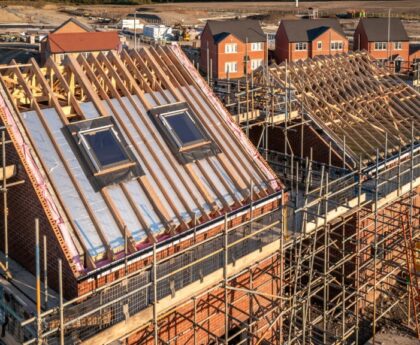To excel in the construction industry, you’ve got to showcase technical expertise, particularly in understanding building materials and operating heavy machinery. Demonstrating a solid grasp of building codes and safety protocols guarantees compliance and fosters durability. Also, having project management acumen and effective communication skills boosts team collaboration. Prioritize health and safety by promoting robust safety cultures. Adaptability, innovation, and leadership aren’t just assets but essentials. There’s more to explore to master these qualities truly.
Technical Proficiency in Construction Tasks
Technical proficiency is the backbone of any construction professional’s skill set. By embracing technical innovation, you can transform how you interpret blueprints, enhancing your ability to communicate with architects and engineers effectively. Skill enhancement in reading technical drawings guarantees precise project execution and seamless site coordination. Understanding the intricacies of building materials and heavy equipment usage further elevates your capabilities. Additionally, sharpening problem-solving and mathematical skills enables you to address project challenges swiftly. Proficiency with tools, both hand and digital, is essential. It assures you’re at the forefront of evolving construction technologies, driving projects forward with precision and innovation. Mastering various building skills, from carpentry to electrical work, empowers you to tackle diverse tasks confidently and efficiently. Understanding [building codes and safety regulations is critical for ensuring that all work adheres to necessary standards, thereby promoting the long-term safety and reliability of constructed structures.
Mastery of Building Codes and Regulations
When working in the construction industry, mastering building codes and regulations isn’t just an option—it’s essential for ensuring compliance and legal integrity. By thoroughly understanding these codes, you can navigate complex legal requirements and significantly impact your project’s success. Your expertise in these areas safeguards safety and quality and enhances your professional value and career prospects. Familiarity with different types of heavy equipment is valued, as it allows you to manage and maximize available resources on the job site efficiently.
Importance of Compliance
Compliance is the backbone of successful construction projects, guaranteeing that every aspect adheres to stringent building codes and regulations. As a professional in the industry, you know that mastering compliance isn’t just about avoiding penalties; it’s about safeguarding public safety and maintaining your company’s reputation. Regular compliance training and staying abreast of regulatory updates are critical. The complexity of codes demands that you continuously educate yourself to keep up with evolving standards. Technology, like BIM and AI, revolutionizes how you manage compliance by automating tasks and enhancing code interpretation accuracy. Professionals must adapt quickly to emerging compliance technologies in the Asia Pacific region, recognized as the fastest-growing market with a CAGR exceeding 14{6026ae719b8f18d986a6eb050c3db48ca152cf3dd739a50ab8eefa6990c4879b}. Your proficiency in construction software guarantees you meet code requirements efficiently. Embrace these tools and practices to lead innovative, compliant projects that stand out in today’s competitive market.
Navigating Legal Requirements
Navigating the intricate web of building codes and regulations is no small feat, yet it’s crucial for the success and legality of any construction project. As a forward-thinking construction professional, you must master these legal frameworks by staying ahead of regulatory updates. The complexity of codes means compliance isn’t just about knowledge—it’s about strategy. Integrate technology solutions like code compliance software and BIM to streamline this process. Regular code reviews during design and construction phases guarantee you’re aligned with evolving standards. Foster a culture of open communication within your team to prevent costly misunderstandings. Building codes are regularly updated to account for new technologies and safety concerns, making it essential to stay informed. Continuing education is essential; staying informed empowers you to interpret blueprints accurately and mitigate risks effectively. Engage specialists to maintain a competitive edge and guarantee compliance.
Impact on Project Success
Understanding building codes and regulations isn’t just a bureaucratic necessity; it’s a pivotal factor in determining a construction project’s ultimate success. Your mastery of these codes directly influences project outcomes and boosts construction efficiency. Building codes govern structures’ design, construction, and maintenance, ensuring public safety, health, and welfare. Adhering to standards like the International Building and National Electrical Code safeguards public health and provides structural stability. This expertise allows you to streamline the permitting process and prevent costly delays or legal troubles. Staying informed about regular updates to these codes means you can incorporate new technologies and address emerging safety concerns, fostering innovative solutions. Fundamentally, your extensive knowledge enhances safety and compliance and fortifies your value to employers, ensuring that your projects align with modern standards and expectations.
Effective Communication Skills
In the fast-paced construction world, practical communication skills are indispensable for guaranteeing project success and fostering a collaborative work environment. Mastering these skills enhances team collaboration by streamlining the flow of information. Embrace communication tools like project management software and visual aids to bridge gaps and optimize processes. Clear, concise messaging is vital; avoid jargon to facilitate understanding across diverse teams. Regular communication allows for the [monitoring of progress](https://www.outbuild.com/blog/why-is-communication-important-in-construction) and addressing issues promptly among stakeholders, which is crucial for maintaining project momentum and preventing delays.
- Active Listening:Prioritize attentive listening to grasp stakeholders’ needs and expectations fully.
- Regular Updates:Keep everyone informed with consistent updates and encourage feedback to build transparency.
- Adaptability:Adjust your communication style to fit different audiences and contexts, promoting inclusivity.
Attention to Detail and Problem-Solving Abilities
Building on the foundation of effective communication, attention to detail and strong problem-solving abilities are essential in construction. Your technical expertise in blueprint accuracy and familiarity with safety protocols guarantee nothing slips through the cracks. Employ attention strategies by double-checking measurements and continuously reviewing plans. This detail orientation prevents costly errors, boosts safety, and enhances project quality. Meanwhile, your problem-solving prowess hinges on analytical and critical thinking. A proactive approach and adaptability are key when unexpected challenges arise. Collaboration is essential, especially under [tight deadlines](https://www.619recruiting.com/2024/12/19/the-skills-that-make-you-irreplaceable-in-construction-insights-from-top-employers/), ensuring that teams work seamlessly to resolve issues. Collaborate effectively with your team to tackle issues head-on. Continuous training and open feedback channels enhance your skills, driving efficiency and innovation. By mastering these traits, you’ll not only meet but exceed industry standards, guaranteeing successful project outcomes.
Project Management and Organizational Skills
In construction, mastering project management and organizational skills is essential for success. You’ll need to efficiently allocate resources, ensuring every tool and team member is ideally utilized while employing deadline management strategies to keep projects on track. By honing your ability to conduct impactful decision analysis, you can make informed choices that drive project success and minimize delays. A strong understanding of building code knowledge ensures safety and compliance throughout the project’s lifecycle.
Efficient Resource Allocation
While efficient resource allocation stands at the core of successful construction project management, it requires a meticulous blend of strategic planning and organizational prowess. As a forward-thinking professional, you must master resource forecasting to anticipate future needs and avert shortages. Collaboration strategies are essential, as they leverage team expertise and ensure seamless communication with stakeholders. Labor shortages can lead to project delays and increased costs, highlighting the need for innovative recruitment and retention strategies. Here are key components to enhance your resource allocation:
- Thorough Resource Forecasting:Predict needs accurately to avoid bottlenecks.
- Collaboration Strategies:Foster teamwork to drive innovative solutions.
- Technology Utilization: Implement BIM and project management software for precision.
Deadline Management Strategies
Successful deadline management in construction projects hinges on a robust blend of project management and organizational skills. By utilizing deadline prioritization techniques, you can develop a thorough project schedule encompassing all tasks, from site preparation to final inspections. Implement a phased approach to break down projects into manageable stages, guaranteeing dependencies don’t lead to delays. Establish milestones for critical stages, like foundation completion, and leverage software tools like Procore for visualization. Regular progress checks with subcontractors enable early detection of issues. Embrace deadline adjustment methods by monitoring key performance indicators and utilizing real-time visibility to reschedule tasks swiftly. This proactive approach guarantees resources are allocated effectively, maintaining project momentum and innovatively meeting client expectations. Clear communication is essential for preserving project deadlines and [avoiding misunderstandings](https://blogs.ezelogs.com/managing-project-deadlines-in-construction/), ensuring that all team members know their responsibilities and timelines.
Impactful Decision Analysis
An impactful decision analysis in construction project management calls for a seamless integration of task and resource management with keen organizational skills. You need to employ data analytics and predictive modeling to make informed choices that drive innovation and efficiency. Analytical examination uncovers task priorities and resource allocation strategies, ensuring projects run smoothly without costly delays or overruns. Integrate project management tools like Kanban boards and BIM to visualize workflows and anticipate risks. As quantity surveying has evolved from a measurement focus to broader responsibilities, professionals now leverage [analytical skills](https://www.kreo.net/news-2d-takeoff/the-crucial-role-of-analytical-skills-in-quantity-surveying) to optimize cost planning and enhance risk management.
- Data-Driven Insights:Leverage historical data to forecast trends and optimize decision-making.
- Predictive Modeling: Use these models to anticipate future challenges and adjust project plans accordingly.
- Collaborative Decision-Making:Foster teamwork and shared intelligence to enhance project outcomes.
Adaptability and Leadership Qualities
In the fast-paced world of construction, adaptability and leadership qualities are vital for maneuvering the ever-changing landscape of project demands and technological advancements. You need adaptive strategies to handle change management effectively. You’ll respond adeptly to shifting project requirements by embracing continuous learning and flexibility. Problem-solving and economic awareness further bolster your capacity to navigate unexpected challenges and sustainable practices. Visionary leadership styles are essential. You must guide your team with a clear vision, embracing inclusivity and trustworthiness: data-driven decision-making and a collaborative approach guarantee informed successful outcomes. Empowering team members and fostering open communication creates a culture ripe for innovation. As adaptive leadership emphasizes engagement and collaboration, involving all team members in problem-solving is essential. Embrace these qualities to transform challenges into opportunities and lead the industry into the future.
Health and Safety Awareness
While visionary leadership and adaptability drive progress in construction, health and safety awareness remains the cornerstone of a productive work environment. Embracing a robust safety culture guarantees injury prevention and fosters innovation. With 169,600 injuries reported in 2022, prioritizing safety is non-negotiable. You can transform your workplace by investing in training, as every dollar spent saves $4 to $6. Yet, despite its importance, only 2.6{6026ae719b8f18d986a6eb050c3db48ca152cf3dd739a50ab8eefa6990c4879b} of budgets focus on safety training. Construction has the second most workplace deaths of all industries, emphasizing the critical need for stringent safety measures.
Consider these compelling points:
- Engagement Boost:Introducing a Health & Safety plan increases worker engagement by 74{6026ae719b8f18d986a6eb050c3db48ca152cf3dd739a50ab8eefa6990c4879b}.
- Cost Efficiency:Medically consulted injuries average $42,000 each.
- Proactive Measures: Meeting OSHA standards can prevent costly violations and fines.
Building a culture of safety is essential for a thriving construction environment.
Proficiency in Operating Heavy Equipment
Mastering heavy equipment operation is vital for any construction professional to enhance site efficiency and safety. To excel, you need thorough operator training covering the machinery spectrum, from excavators to forklifts. Understanding each machine’s range and limits, and knowing how to select safe loading and unloading areas guarantees you’re always working within safe parameters. Your ability to maneuver across complex terrains while maintaining precision sets you apart in this field. Regular maintenance, like checking fluid levels and conducting inspections, is key to preventing downtime. Proficiency in monitoring equipment operation and reading gauges ensures that machines function optimally, reducing the risk of accidents. Certifications such as HEOC and HEC demonstrate your commitment to industry standards. Continuous learning and honing your mechanical aptitude guarantee that you’re not just keeping up but leading in innovative practices.
Knowledge of Building Materials and Techniques
Operating heavy machinery effectively lays the groundwork for a successful construction project, but a thorough grasp of building materials and techniques is equally vital to excel truly. Mastering material innovations and sustainable practices enhances project outcomes and propels you ahead of the competition. Concrete, steel, and wood each offer unique properties essential for structural integrity while emerging trends like smart materials and nanomaterials pave the way for cutting-edge solutions. By understanding the intricacies of each material, from cost implications to environmental impacts, you guarantee compliance with local and national standards while boosting aesthetic appeal. Effective coordination, budgeting, and timeline adherence are critical for success, as projects vary in scale and complexity.
- Concrete: Versatile and durable but has a high carbon footprint.
- Smart Materials: Offer self-healing and adaptability.
- Sustainable Materials: Eco-friendly and innovative.
Conclusion
So, you think you’re ready to be the construction industry’s next superstar? Just juggle technical skills, building codes, and communicate like an over-caffeinated project manager. Don’t forget to notice every nail out of place while solving problems like a superhero with a hard hat. Master project management, leading like a charismatic foreman and guaranteeing safety is your mantra. Oh, and operate heavy machinery while knowing every material like it’s your best friend. Easy, right? Good luck!





